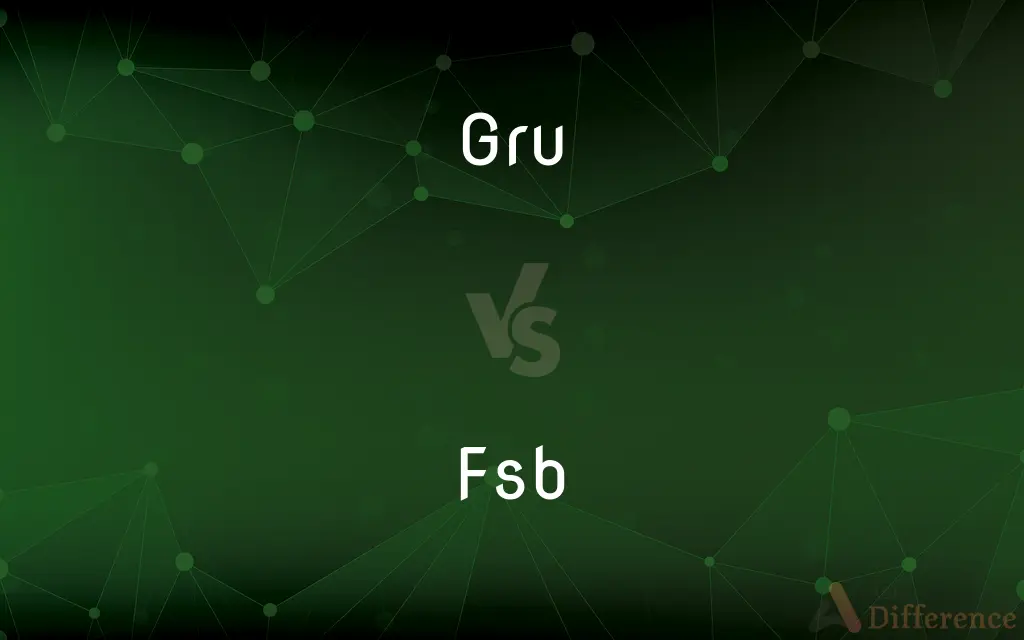Gru vs. Fsb — What's the Difference?
By Urooj Arif & Fiza Rafique — Updated on April 8, 2024
GRU, Russia's military intelligence, focuses on foreign operations and military espionage, whereas FSB, the Federal Security Service, handles domestic security, intelligence, and counterterrorism within Russia.

Difference Between Gru and Fsb
Table of Contents
ADVERTISEMENT
Key Differences
The GRU, or Main Directorate of the General Staff, primarily deals with military intelligence and espionage activities outside of Russia, targeting foreign governments, militaries, and related entities. This focus places a premium on gathering intelligence that can be used to support Russian military and strategic interests globally. On the other hand, the FSB, or Federal Security Service, is tasked with ensuring Russia's internal security. It deals with a range of issues including counterterrorism, counterintelligence, and the surveillance of the population to prevent internal dissent and destabilization.
While the GRU operates under the jurisdiction of the Russian Ministry of Defence, focusing on global intelligence gathering, the FSB reports directly to the President of Russia and is more involved in law enforcement activities within the country. This structural difference highlights the distinct operational domains and priorities of each organization, with the GRU's activities being more outward-facing and the FSB's more inward.
The GRU is known for its secretive operations and has been implicated in various high-profile cyber espionage activities worldwide. Its operations are geared towards collecting intelligence that supports Russian military and geopolitical strategy. Conversely, the FSB has been actively involved in counterintelligence efforts within Russia, working to thwart espionage and terrorist activities, and has often been associated with efforts to suppress political dissent and monitor political activity within Russia.
In terms of legal authority and domestic influence, the FSB has broad powers within Russia, including the ability to conduct surveillance, detain suspects, and influence legal processes. The GRU's authority, while extensive in its own right, primarily extends to military and foreign intelligence operations, without the same level of domestic enforcement power.
Comparison Chart
Primary Focus
Foreign intelligence and military espionage
Domestic security, intelligence, and counterterrorism
ADVERTISEMENT
Operational Scope
Global
Within Russia
Under Jurisdiction
Russian Ministry of Defence
Directly reports to the President of Russia
Known For
Secretive operations, cyber espionage
Counterintelligence, surveillance, suppressing dissent
Legal Authority
Military and foreign intelligence operations
Broad domestic enforcement power, surveillance, detainment
Compare with Definitions
Gru
Military Intelligence Agency.
The GRU is tasked with gathering foreign military intelligence for the Russian government.
Fsb
Domestic Security Service.
The FSB's primary role is to ensure Russia's internal security and counterterrorism efforts.
Gru
Cyber Espionage.
The GRU has been implicated in various cyber attacks targeting foreign governments.
Fsb
Direct Presidential Reporting.
Unlike the GRU, the FSB reports directly to the President of Russia, reflecting its significant domestic role.
Gru
Under Ministry of Defence.
Operating under the Russian Ministry of Defence, the GRU focuses on supporting military objectives.
Fsb
Surveillance and Monitoring.
The FSB has the authority to monitor communications and activities within Russia to maintain security.
Gru
Global Operations.
GRU operatives are known for conducting espionage activities around the world.
Fsb
Counterintelligence Operations.
FSB agents are involved in detecting and preventing espionage within Russia.
Gru
Secretive Nature.
The GRU's operations and organizational details are closely guarded secrets.
Fsb
Political Dissent Monitoring.
The FSB is actively involved in monitoring and suppressing political dissent in Russia.
Gru
Felonious Gru, or Felonius Gru, is a fictional character and the protagonist of the Despicable Me film series. Voiced by American actor Steve Carell, he has appeared in all five films in the series.
Fsb
The internal counterintelligence agency of the Russian Federation and successor to the Soviet KGB; formerly led by Vladimir Putin
Fsb
A federally chartered savings bank
Common Curiosities
Can FSB conduct operations outside of Russia?
Primarily, FSB's mandate is within Russia, though it can be involved in international operations related to national security.
What is the GRU? The GRU is Russia's military intelligence agency focused on foreign intelligence gathering.
What does the FSB do?
Are GRU operations more secretive than FSB's?
Both organizations are secretive, but the GRU is particularly noted for its clandestine foreign operations.
Which agency has a broader domestic power?
The FSB has broader legal authority and domestic power within Russia.
How does the international community view the GRU and FSB?
Both agencies are viewed with suspicion due to their involvement in espionage and internal repression.
How does the FSB's role compare with similar agencies in other countries?
The FSB's role is similar to that of the FBI in the US but with broader surveillance powers.
Has the GRU been involved in political interference abroad?
There are allegations of GRU involvement in election interference and destabilization efforts in foreign countries.
The FSB is responsible for Russia's internal security, including counterintelligence and counterterrorism.
How do GRU and FSB differ in jurisdiction? GRU operates under the Ministry of Defence with a global focus, whereas FSB focuses on domestic security and reports directly to the President.
Does the FSB monitor Russian citizens?
Yes, part of the FSB's role includes surveillance and monitoring to prevent dissent and terrorism.
What role does the GRU play in Russian military strategy?
The GRU provides essential foreign intelligence to support Russian military planning and operations.
What kind of legal powers does the FSB have?
The FSB has extensive legal powers for surveillance, detainment, and counterintelligence within Russia.
Is the GRU involved in cyber warfare?
Yes, the GRU has been implicated in cyber espionage and attacks against foreign targets.
Are GRU agents deployed overseas?
Yes, GRU agents operate globally to conduct espionage and gather foreign intelligence.
Do GRU and FSB collaborate on intelligence matters?
While they have distinct roles, GRU and FSB may collaborate on matters of national security.
Share Your Discovery

Previous Comparison
Blaster vs. Blister
Next Comparison
Stola vs. ChitonAuthor Spotlight
Written by
Urooj ArifUrooj is a skilled content writer at Ask Difference, known for her exceptional ability to simplify complex topics into engaging and informative content. With a passion for research and a flair for clear, concise writing, she consistently delivers articles that resonate with our diverse audience.
Co-written by
Fiza RafiqueFiza Rafique is a skilled content writer at AskDifference.com, where she meticulously refines and enhances written pieces. Drawing from her vast editorial expertise, Fiza ensures clarity, accuracy, and precision in every article. Passionate about language, she continually seeks to elevate the quality of content for readers worldwide.
















































